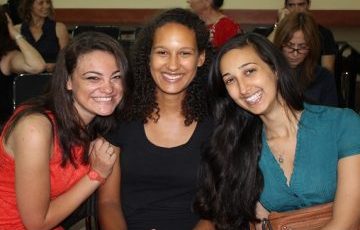By Deena Martin and Emma Jaszczak, Masa Israel Teaching Fellows in Ben Shemen Youth Village

1. You will suddenly become the proud pseudo-owner of approximately 100 new cats, dogs, horses, cows, and (1) sheep.
A youth village is a very communal place, and that community includes a plethora of animals. This coexistence comes in the form of everything from making noise to alert the cats in the dumpster to move, to going out to the horse barn to visit your students doing their chores and feeding them some hay (the horses, not the children), to the occasional physical knock on your door from small dogs who just want to come visit you at your apartment (that last one is absolutely based on a true story). You’re never really alone here.

2. You will become the most knowledgeable of all of your friends about the various ways to cook using one hotplate, a kum kum, and a panini maker in a small kitchen.
Not only will you learn what on earth a kum kum is, but you will have enough knowledge about how to use one to fill a wittily named cooking blog. You’ll learn to make instant coffee, hard boil eggs, boil pasta, heat sauce packets, and steam a shirt, all with your one tiny appliance. You’ll also become a pro at one-pan meals and hone in on your skills for your future “Chopped” amateur debut. Long story short, you will become very creative in the kitchen in order to avoid the ruckus of the dining.

3. When your students leave something in their room, they can walk over and get it.
This can have its pros and its cons. Just because your student can walk to their room to get something, doesn’t mean they’ll come back in time for class. When avodah (village chores), living space, and school are all in one place, the lines can blur and sometimes their motivation blurs with them. Still, the ability to walk across the road and help your students with their homework or practice their English speaking skills with them is definitely an experience unique to this special community.

4. You have two grocery stores: The village kitchen and the “real” grocery store.
A very convenient aspect of living in a youth village is the ability to ask for certain food items from the kitchen every week – FOR FREE. Things like vegetables, eggs, milk, bread, hummus, chocolate spread, margarine, cornflakes and other basics are all readily available as long as they’re in stock. Here’s the catch: your grocery list must be thoughtfully itemized and meticulously translated into Hebrew. There is also the real grocery store adventure: a bus ride into the neighboring city to find things like avocados, cheese, and Trix cereal. It takes time to figure out where to get which groceries, but it will happen leat, leat (slowly, slowly as they say in Israel).

5. You will be a full-time member of your students’ lives.
They will see you in the dining hall, in classes, around their avodah jobs, at the study center, and in their boarding school areas. They will invite you to their basketball games and ask if you’ll look at their newest drawing or read the short story they wrote in English that they worked really hard on. They’ll tell you when their birthday is, and then tell you how surprised they are and how much it means to them that you remembered, especially when they can’t be with their biological family to celebrate. You have the opportunity to be so much more than a teacher to them. You have the opportunity to be present.












